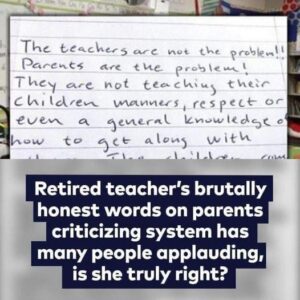
The majority of people concur that education is important, especially for young people. Even though they occupy such a prominent position, teachers are frequently overworked and underpaid.
Educating the next generation excites and motivates many who enter the field, but many leave disillusioned and burned out these days. They deal with a variety of issues, and some of them attribute their burnout to certain factors. However, parents of the students are frequently the target of complaints.
An opinion piece that a retired teacher published in a newspaper in 2017 detailing her complaints about the classroom has gone viral online ever since it was published. Many struggling teachers today seem to agree with the article’s reliability.
“Parents are the problem”
The parent-teacher dynamic is therefore more difficult to manage than it has ever been. During the pandemic, some students fell significantly behind their peers. The widespread lack of teachers is exacerbating the fatigue and burnout experienced by those who remain in the classroom. Many claim that since the pandemic, children’s behavior has gotten worse, making pre-pandemic routines and techniques ineffective.
“So many routines were disrupted for students, teachers, and their families. Even for states that didn’t extend school closings, routines at home were disrupted, and that is very difficult for young minds to comprehend,” says Brandi David, MEd, a Florida-based K-8 educator specializing in mathematics and development editor for Hand2Mind.
“Relationships matter”
Maybe the need for schools to adapt to the times is something that both parents and educators can agree on. The modern world and its particular challenges have not yet been addressed by curriculums, schedules, and the like.
Inequity, teaching life skills, technology integration, and other areas are areas that schools need to improve, according to Patricia A. Edwards, Ph.D., a distinguished professor at Michigan State University who specializes in supporting literacy learning and development for families of color.
“In response to these criticisms, many education reform efforts are underway, focusing on curriculum modernization, personalized learning, increased use of technology, and a shift away from standardized testing,” Dr. Edwards says. “These changes aim to better align K-12 education with the changing demands of the contemporary world.”
In the meantime, parents and teachers need to work together to make the most of children’s education. “The best way to keep students accountable for their behaviors is to have a working relationship with the parents,” says David. “…Teachers should share with parents what they are doing, if it’s working, such as a calming corner, breathing techniques, and opportunities to correct their behavior.”
Leave a Reply